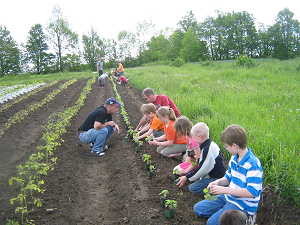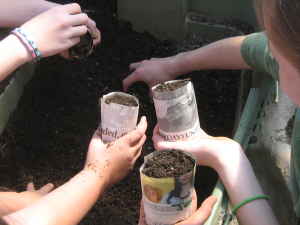Author Archive
OTF Grant helps to bring Earth Day message to High School Students
Owen Sound, ON – The Georgian Triangle Earth Day Celebrations launched their environmentally-focused film festival for students today, thanks in part to a $25,500 grant from the Ontario Trillium Foundation (OTF). Leigh Butler, local OTF Grant Review Team member was joined by guest speaker Barbara Hayes, Director of the Canadian Youth Climate Coalition, as students at the Owen Sound Collegiate and Vocational Institute gathered for the launch.
Oct 24 Day of Climate Action Success
Our Georgian Bay walk was a great success. We continue on from here right to Copenhagen and beyond!



Walk for Climate Action
 On October 24 at 3:50 PM join Georgian Triangle Earth Days Celebrations, Collingwood Music Festival and the Nagata Shachu Taiko Japanese Drumming Ensemble as we start our walk for Climate Action on Hurontario Street at the Loblaws supermarket and make our way south up Collingwood’s main street. We have a banner that was made by youth. We will be giving out flyers to people urging them to work together to lower greenhouse gas emissions to 350ppm in our atmosphere. For those who wish to get back to the start of the march , where you left your cars or bicycles, a van or the Collingwood biobus will will take you back at 6 PM.
On October 24 at 3:50 PM join Georgian Triangle Earth Days Celebrations, Collingwood Music Festival and the Nagata Shachu Taiko Japanese Drumming Ensemble as we start our walk for Climate Action on Hurontario Street at the Loblaws supermarket and make our way south up Collingwood’s main street. We have a banner that was made by youth. We will be giving out flyers to people urging them to work together to lower greenhouse gas emissions to 350ppm in our atmosphere. For those who wish to get back to the start of the march , where you left your cars or bicycles, a van or the Collingwood biobus will will take you back at 6 PM.
RAIN/BAD WEATHER CONTINGENCY DETAILS FOR OCTOBER 24 MARCH: If it is bad weather, please meet at 4:30 pm at New Life Church where our drummers will be ready to greet us. For those who wish to walk rain or shine, the march still starts at 3:50 PM at Loblaws and Hurontario for 4:30 PM arrival at New Life Church. We will be drummed around the large foyer and the gym at that time. The rest of the day will go on as already planned with a 350 photo in the gym instead of being outside. That photo will be part of the 350.org collage of photos shown in Times Square, New York City for the next few days after the Day of Action.
Postcards to our Prime Minister, urging his government to ACT NOW on climate mitigation, will be distributed- no postage stamp required. Also, we will be asking the Canadian, Ontario and municipal governments to do more to stop global warming. (Download Postcard)
Since youth will be most affected by climate change in the next 30 years, they will play an important part in the walk. Our banner will be held by many people. A photo will be taken of our group at the end of the march; we’ll be in the shape of 350. For those who wish to get back to the start of the march , where you left your cars or bicycles, a van or the Collingwood biobus will will take you back at 6 PM. From 5 PM to 6 PM there will be educational and fun activities for all age groups. David Lawless, a youth delegate from the recent September UN Climate Conference in Geneva, will speak about climate change and ACTION to youth at 5:30 PM. The concert starts at 7:30 PM.
We are working with people from Collingwood, Barrie, Orangeville, Thornbury, Meaford and Owen Sound. Please participate and be the change. Humans and other species need to return to a safe planet.
At 7:30 PM the Drumming Ensemble will give a concert and dedicate some music to this important Day for Climate Action. There will be Nature displays in the foyer of New Life Brethren Church (28 Tracey Lane & Hurontario Street), where the concert will be taking place. People under 35 (those who are to be most affected by climate change) who attend the walk in the afternoon can come to the concert for free- free passes will be given out at the end of the march!
Please see www.collingwoodmusicfestival.com and www.georgianbayearthdays.org for more information. We are encouraged to hear that the other 350.org Collingwood 100 Mile Green Meal is pleased to support the 3:50 PM walk for climate ACTION. In order to have a large turnout, we will be spending the next few weeks before October 24 giving the power point slide show that 350.org has on its website as a launch for further discussion in schools, libraries and other community centres. For example, Collingwood Library had a 350 slide presentation on Saturday October 17 at 2PM. The presentations look at how a target of 350 parts per million of CO2 encompasses many directions for civilization and a return to a stable holocene era. As well, the Library is giving out our 350 flyer as book marks when you take out a book.
Please join us and help us make a banner at the Library all week long till October 24!
Summer Reading to Make Us Rise Up and Act for our Children
Andrew Barnosky is a paleoecologist. His new book, “Heatstroke: Nature in an Age of Global Warming”, speaks of four bad players creating the destruction of many ecosystems around the world: population, global warming, invasive species and forest fragmentation. Professor Barnosky’s a scientific Sherlock Holmes who looks at how the world’s climate has constantly changed over millions of years. This sleuth brings us to caves and other places, including Yellowstone National Park that show the fossil evidence of climate change as well as extinctions over millions of years. With the greatest of clarity he explains his scientific terminology and is able to show the reader that in the past million years biodiversity has been able to ride out the worst of glacial or inter-glacial changes. Here’s an important word that we should all become acquainted with: ‘phenology’. It describes the correlation between climate and the natural cycles of nature such as migration of birds, hunting for food, polar bears or plant flowering. He says that species can’t keep up with humanity’s unprecedented tampering with Earth’s climate; extinctions are happening at an alarming rate compared to what has occurred in the last several hundred thousand years. As well, huge human population increases in the last (and the next) fifty years pose some of the greatest threats to the stability of our planet’s ecosystems. Invasive species has lowered the wealth of biodiversity, making the Earth one big box store of the same species.
“The trick now, of course, is to actually use our foresight and abilities not only to dodge but also to deflect the bullets heading our way- including, perhaps especially, the ones aimed squarely at Earth’s ecological heart…The reason Earth is in peril is because of individual actions. Just as the problem is the sum of what each one of us is doing, so is fixing the problem. That means we each hold a little part of the future of the world in our hands. “
Richard Wilkinson and Kate Pickett’s 2009 book “The Spirit Level: why more equal societies almost always do better” enables us to understand how we can make a difference in creating a better world It is very clearly argued in the “Spirit Level” that the more equal a society is, the better it is able to wrestle with many of our problems, including global warming, and create a healthier, safer and happier nation.
Even though there are many graphs and statistics throughout the book, it never becomes one more academic treatise. The authors are really speaking to us in the West and particularly in North America, saying the vast inequality between rich and poor is bringing down our society. As well, our monstrous carbon footprint points to an unhappy group of people addicted to consumerism. These excesses include the self-indulged use of planes and cruises as well as creating a disastrous cult around the priority of economic growth over Nature and community. Flying or boating into a pristine sensitive destination such as the Galapagos Archipelago as an ‘eco-tourist’ is many times defended because of the economic benefits that are derived from such tourism. It’s far better to stay close to home to enjoy Nature. The authors of ‘Spirit Level” show in great detail that more equal societies such as Cuba, Norway or even Japan are also much happier societies. Finally, a ‘steady-state economy’ keeps unwarranted growth at bay but need not be a stagnating society. Living within our ecological means creates a more resilient and creative people in balance with each other and the biosphere.
These are just two excellent reading possibilities. W.H. Hudson’s ”Far Away & Long Ago: A childhood in Argentina” will inspire anyone who wants Nature to return to its former splendour, Chris Goodall’s “How to Live a Low-Carbon Life: the individual’s guide to stopping climate change” is a great gift for a true friend who needs to drastically lower their carbon footprint and won’t hate you for telling her it’s time to change.
Biophysical Economics and the Limits to Growth
“Common Sense is the collection of prejudices acquired by age eighteen.
We cannot solve our problems with the same thinking we used when we created them.”
Albert Einstein
During the 18th century a group of politicians and economists in France realized that unless governments are guided by a policy that respects and works within the laws of Nature that govern our ecosystems, no economic system can last for long. Economics, guided by Natural Law, would be the basis of a strong and sustainable agricultural society. These people were called Physiocrats. Unfortunately, François Quesnay and his disciples’ balanced economic policies were soon overshadowed by the industrial revolution. However, in the 19th century, scientists such as Carnot, Ostwald and a social scientist named Podolinsky were all inspired by the discovery of the Laws of Thermodynamics. They began the process of expanding economic theory to include a human interwoven dependency on Nature and energy. By realizing that there are limitations and laws regulating the use of energy, these people advocated a more holistic approach to economics. Like the Physiocrats, these forward thinking people realized that all economic growth must be held accountable to physical and ecological laws. In other words, we ought to seek out a sustainable policy in energy usage. Modern Biophysical Economics or Steady-State-Societies acknowledge ecological services as the basis for any economy. Limitless growth economic models must be abandoned.
Our recent economic crash makes it imperative that we create a new economy based on the thoughts of these prescient people. The limits of economic growth can be found to have a mirror in Nature. Our energy derived from solar income is vast compared to our dwindling stored solar income found in fossil fuels. Alternatives to fossil fuels need to be the basis of a new biophysical economy acted out within strict ecological guidelines. Self-imposed limits on growth are far better than the ones Nature will dictate if humanity doesn’t act swiftly to discard old economic models.
Humans will do anything rather than give up their allegiance to business-as-usual models. In the August 6 issue of the science journal ‘Nature’, we are told real flaws have existed in our economic models. Those models try to forecast at most a year ahead or run our economies as if we are in a perfect world that can’t even conceive of the crises that now assail us. “As a result, economic policy-makers are basing their decisions on common sense. The leaders of the world are flying the economy by the seat of their pants. “, J. Doyne Farmer and Duncan Foley tell us.
Schemes such as having several thousand wind-powered ships spray water from the oceans to make white vapour clouds that solar radiation bounce off of, is one of many geo-engineering ideas now circulating. We’ll do anything to circumvent simpler solutions that actually lower greenhouse gas emissions but are perceived as getting in the way of growth. Geo-engineering is viewed as the panacea of climate change deniers, corporations and policy makers that wish to prop up institutions that will inevitably collapse anyway once stimulus and bail-out packages are shown to be what they are. The greatest tragedy of these bail-outs is the wealth that has been squandered while more humanistic solutions such as decentralized community projects flounder due to a lack of capital.
If future generations are to even have a modicum of success we need to look more closely at Albert Einstein’s playful and creative approach to problem solving. As well, societies have to have more faith in its young people and nurture their creativity by letting them not only sit at the decision-making table but encourage them to take the lead. Instead of governments spending trillions of dollars on throwing fraying life-lines to sinking and bloated centralized top-down-bonus-ridden companies, they should ask young adults how money should be spent. Democratic decision–making must employ the ingenuity of the young.
‘Bee’ a friend to nature – be a beekeeper.
“I will arise and go now, and go to Innisfree,
And a small cabin build there, of clay and wattles made:
Nine bean-rows will I have there, a hive for the honeybee,
And live alone in the bee-loud glade.” W.B. Yeats “The Lake Isle of Innisfree”
 Recently in Britain 1,000 people showed up to enroll in a single course for novice bee-keepers. People throughout the world know that bees are in trouble after reading about Colony Collapse Disorder and want to do what they can to stop the honey bees’ decline. By 2006 most apiarists were reporting up to one-third of their bees gone or dead. Is it the various mites, pesticides, long distance traveling that wears down our friends? The largest wild blueberry company in Maine called Wyman’s owns 10,000 acres of blueberry terrain and they know that their 125 year old business is finished if a solution is not found soon. They have given a large grant to scientists to try and find out what needs to be done. Citizen science is also coming forward and helping biologists to understand the problem. Gretchen LeBuhn started the Great Sunflower Project- see www.sunflower.org- to try to have a better knowledge of what bees were up to across Canada and the U.S. She has over 60,000 volunteers who plant a sunflower in their yard, watch for all sorts of bees and then send in their data. It’s a wonderful way to encourage young people to become naturalists and know how important all kinds of bees are for pollination.
Recently in Britain 1,000 people showed up to enroll in a single course for novice bee-keepers. People throughout the world know that bees are in trouble after reading about Colony Collapse Disorder and want to do what they can to stop the honey bees’ decline. By 2006 most apiarists were reporting up to one-third of their bees gone or dead. Is it the various mites, pesticides, long distance traveling that wears down our friends? The largest wild blueberry company in Maine called Wyman’s owns 10,000 acres of blueberry terrain and they know that their 125 year old business is finished if a solution is not found soon. They have given a large grant to scientists to try and find out what needs to be done. Citizen science is also coming forward and helping biologists to understand the problem. Gretchen LeBuhn started the Great Sunflower Project- see www.sunflower.org- to try to have a better knowledge of what bees were up to across Canada and the U.S. She has over 60,000 volunteers who plant a sunflower in their yard, watch for all sorts of bees and then send in their data. It’s a wonderful way to encourage young people to become naturalists and know how important all kinds of bees are for pollination.
After 22 years of keeping bees I can understand why men and women want this ultimate nature hobby. What is so unique about bee-keeping is the egalitarian interaction with another species. The European honey bee, Apis mellifera, is an equal in its relationship with humans. If a bee-keeper does not treat his bees with due respect, or if their lodging is not to their satisfaction, they may just fly away. Good beekeepers are careful to leave enough honey in the hive so the bees survive the winter. Pragmatism and outright admiration for these insect’s social order creates the perfect partnership.
We have all heard of the bee dances that communicate information to the colony. Observing bees enter their colony is an inspiring experience. For example, watch how bees use ‘air-conditioning’ to cool down the hive by using their wings to fan the hot air out of the colony on a scorching summer day. In the fall a person can see the sad exit of perhaps ninety-five percent of the drones (male bees) being shoved out of the colony so the workers and the queen have enough honey for the winter. Catching a swarm is always an adventure. Swarming bees are looking for a new place to live, and swarms of thousands of bees announce themselves with a huge buzz as they cling to a branch. Bees are very safe to work with when they are swarming. If you see a swarm, call a bee-keeper and they will be happy to come by and catch it. Never spray the honey bees with an insecticide. Most people know how important bees are for our local apple industry and vegetable gardens. Fifteen billion dollars of added crops can be directly related to pollination by bees in North America.
There is no bylaw against having bees in the Town of Collingwood. Our bees, in the Beaver Valley, are twenty feet from our house and no one has ever been stung as a result of the hives’ proximity to the house. It would be a good idea to have a fence around the bees or a fenced- in backyard if you live in town. Young people can learn so much by sitting quietly next to the colony and observing all the wonderful activity taking place. Children love extracting honey too. Once the fields of goldenrod have finished in the fall, it is a true celebration tasting the honey and honouring the bees’ work by making sure they have a cozy hive for the winter.
Intransigence and inertia leaves young with few possibilities
“Self-restraint over consumption is a hugely subversive idea in an economic system which has as its core proposition that greater and greater happiness will follow every increase in our personal incomes and spending.” Chris Goodall, “How to Live a Low-Carbon Life
A new study from Princeton University’s Carbon Mitigation Initiative entitled, “Sharing Global CO2 Emissions Among1 Billion Emitters {out of 8.1 billion people in 2030}” points to humanity’s inability to find so far an equitable solution for the protection of our biosphere. This study tries to be a model in fairness with regards to capping world-wide emissions, and thus defuse the on-going conflict between the developed and developing world over who has to do what in order to get the greenhouse gas mitigation programs underway to avoid a catastrophic climate crisis. The study shows that the poorest 3 billion people can have a higher standard of living without any undue hardship incurred by people like ourselves. (Taking aim at world poverty on July 11 was UN World Population Day. We know the burgeoning population in this century means North Americans have to share more and ask for less.) Wealth and high GHG emissions go together: Europeans emit around 12.5 tonnes per person per year with North Americans doubling that amount, while the rest of the world averages less than 5 tonnes for each individual. Canadians would need to lower their emissions to a European level. Otherwise why should the rest of the world believe that any negotiations are credible between the rich and poor? Why would an Indian negotiator ever consider his Canadian counterpart’s proposals are made in good faith when we would not budge on our emissions? This just happened when the G8 industrial powers met the Group of 5 emerging powers last week in L’Aquila, Italy. Canada refused to accept more than “aspirational” goals in meeting temperature and greenhouse gas mitigation targets for 2050. UN Secretary General Ban Ki-moon was not at all pleased with the Group of 8’s action plans. According to World Wildlife Fund, Canada is the worst offender of the Group of 8.
YOUNG ADULTS in ACTION: Mentoring Families through the Clotheslines Climate Action Project
“Actions on climate change require the current generation to make decisions …that will have profound implications for future generations… The cost of inaction is the greatly increased probability of high temperatures with their associated severe consequences. Nicholas Stern, “A Blueprint for a Safer Planet”
Looking for paid employment that makes a difference to our planet and the health of our community? READ ON! Georgian Triangle Earth Days Celebrations is a charitable organization dedicated to energy conservation strategies and climate change mitigation approaches. It starts with science based education and moves as quickly as possible towards action in solving problems for our Earth. GTEDC will be hiring 2 people under 30 and one coordinator to install clotheslines as an alternative energy project to help homeowners and apartment dwellers stop using clothes dryers that consume large amounts of natural gas or electricity.
Here is how it works: a representative will first come to a home to see where the clothesline would be placed. They will have homeowners sign a contract agreeing to the long-term usage of the clothesline. This project will help families cut greenhouse gas emissions. Families also save $100 a year or reduce 6 to 10 percent of their electric bills by using clotheslines. In fact, if we got rid of all our electric/gas dryers we would reduce the emissions equal to145,000 cars in Ontario. That is why this work is so important. Since the goal is to dramatically lower emissions, bicycles will be ridden most days to the various sites. Work will start as early as May 1st. Some employment will run only for the summer but other work will continue to spring.
This pilot project is only the first step in implementing many other low- cost but extremely effective projects. Youth can be the leaders in achieving successful change and be paid to do so! As engaged and informed persons on climate issues know, older adults need help in finding alternatives to an out-dated ‘growth-is-best’ consumer driven ethos. Many young people feel hopeless with regards to fighting climate change, but hope means rolling up your sleeves and turning good ideas into actions.
Write to celebrateearth@yahoo.ca if you are a motivated young adult who wants to lead the way with meaningful actions and desires to work on this innovative team project. Tell us about yourself and when you are interested in working. Our corporate partner, Home Hardware in Thornbury, will reduce the cost of a clothesline package by 25 per cent to help make this a successful project. This project will go ahead in early July if public sector funding is also received.
Recently EcoJustice and one of its lawyers, Albert Koehl, worked to make all municipalities in Ontario clotheslines-friendly, thus overturning bylaws that had previously prohibited them. GTEDC wants to celebrate their efforts by putting into action this Ontario law. Projects such as Clothesline Action need young adults to be in the vanguard because they know what is at stake and can inspire other people to make a huge difference.
Clearly, young people can no longer take the chance that older generations will act on their behalf. University of Calgary’s David Keith says “People talk a lot about spending money for future generations but typically they don’t do it very much.” Just take a look at the recent UN Framework Convention on Climate Change negotiations in Bonn, Germany. “As the Secretariat’s analysis shows, the pledges of rich countries add up to a negligible cut in carbon pollution, jeopardizing the welfare of our children.” See www.climatenetwork.org
“The trick now, of course, is to actually use our foresight and abilities not only to dodge but also to deflect the bullets heading our way- including, perhaps especially, the ones aimed squarely at Earth’s ecological heart…The reason Earth is in peril is because of individual actions. Just as the problem is the sum of what each one of us is doing, so is fixing the problem. That means we each hold a little part of the future or the world in our hands… It’s never been easier for you to help change the course of the planet. “
Anthony Barnosky, “Heatstroke: Nature in an Age of Global Warming”
World Environment Day on June 5 points us towards Copenhagen in December
“The Campaign against climate change is an odd one. Unlike almost all the public protests which have preceded it, it is a campaign not for abundance but for austerity. It is a campaign not for more freedom but for less. Strangest of all, it is a campaign not just against other people, but also against ourselves.” George Monbiot,”Heat; How to stop the planet from burning”
The United Nations is framing World Environment Day on June 5 as a day of action by saying, “Your Planet needs you: Unite to Combat Climate Change”. The host for this year’s Billion Tree Campaign is Mexico who promises to plant a quarter of these trees. This is also part of a campaign to highlight the urgency to act now and make the December climate negotiations in Copenhagen succeed in bringing about a post-Kyoto deal on drastically reducing greenhouse gas emissions.
On May 30, Professor Thomas Homer-Dixon from University of Waterloo gave an impassioned talk in Collingwood on climate change. The two-hour talk and discussion started off with a picture of his young children. He believes that in the next twenty years his children will question him as to his role in stopping the collapse of the natural world and civilization. The talk was an exploration of how we can make our societies more resilient through renewable energy, changing our values and our willingness to fully embrace a conservation ethic. He backed up his cogent arguments with the latest scientific evidence that unequivocally flags the need to act aggressively to combat climate change. Thomas also says that we must find the courage to demand creative alternatives to the business-as-usual, rigid growth models that can’t continue without the destruction of a benign climate. “A value system that makes endless growth the primary source of our social stability and spiritual well-being will destroy us…Alternative values might… promote broader, fairer and more vigorous democracy”, he says in “Upside of Down” and in his lecture. Alternative values that celebrate Earth as opposed to conquering it, could support a steady state economy.
Professor Homer-Dixon speaks of a power shift happening around the world that can bring huge suffering to humanity. There are two billion people who don’t make $2 a day and it is an explosive situation. “Dislocated lives, worsened poverty, and wider income gaps affect the motivation to participate in violence by providing fodder for extremist leaders.” Climate change will exacerbate the deep divide between groups and the disparity between rich and poor will widen. A ‘power shift’ will mean that there is a greater possibility for terrorism.
Fortunately, there is another ‘power shift’ that is gaining ground; youth are leading the way. Canadian Youth Climate Coalition (See www.ourclimate.ca) will be having a three day (October 21-23) forum. They have decided to reach out towards the international Power Shift (See www.powershift2009.org) movement in the U.S., U.K. and Australia. All levels of Canadian government are asked to cut carbon dramatically and immediately, invest in a green economy, power our future with clean energy and not dirty fuels, and lead the world to a clean and equitable energy future. Their inaugural conference call last week brought together 40 people from across Canada, and it became abundantly clear that these bright and articulate youth can put together the workshops and strategy sessions culminating in a huge ‘lobby’ day on October 23. “We will deliver our message of change to our elected officials and push the federal government to take bold steps in tackling climate change.” Youth are embarrassed at seeing the Canadian government declared a “laggard” in not implementing, and in many cases blocking, international climate initiatives.
World Environment Day is a sign post that directs us towards taking our planetary responsibilities seriously. It is one of many vital clarion calls to action. Please visit Ottawa this October 21-23 and unite with young people in their fervent wish for a safe future. They deserve your full commitment.



